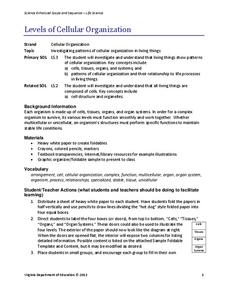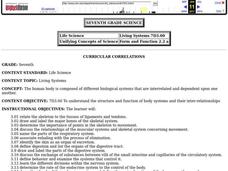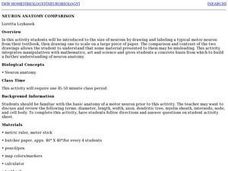Curated OER
Regulating the Internal Environment
This presentation begins with the many problems multicellular organisms which rely on diffusion encounter. There are many diagrams of mammalian organ structures, and they are labelled with their relevant functions. This an excellent...
Curated OER
Support and Transport in Plants
All types of transport systems in a dicotyledon plant are detailed here, with clear labelled diagrams and notes for the specific structures and functions. The way that these systems have adapted, and how support is assisted by the...
Curated OER
Macromolecules
Titled "Macromolecules," this activity does not cover carbohydrates. However, it is a worthy quest to uncover the properties of lipids and proteins. Biology pupils write short answers to detailed questions about the structure and...
Curated OER
DNA and Genes
In this DNA worksheet students will label the 6 parts that make up DNA and review the process of replication of DNA. This worksheet has 6 matching and 5 fill in the blank questions.
Curated OER
Organelles
Students explore the functions of major eukaryotic organelles. They compare and contrast prokaryotic and eukaryotic cells. Given diagrams and drawings, students take turns drawing structures, discussing their function, and labeling...
Virginia Department of Education
Levels of Cellular Organization
What an eccentric way to learn about each level of cellular organization! Allow emerging biologists to utilize white paper and create their own foldable charts to describe each level of organization in the body. You may also adapt the...
Curated OER
DNA - The Double Helix
In this DNA worksheet, high schoolers read information about DNA and messenger RNA. Then students complete 16 short answer questions and color 2 images.
Curated OER
Metabolism Test Review
In this metabolism test review, students define several terms. Students write balanced chemical equations for aerobic cellular respiration. Students complete several multiple choice questions.
Curated OER
DNA Extraction
Students extract and observe a visible amount of DNA from Escherichia. coli cells. They discuss the properties of DNA. Confirmation of the presence of DNA by a reaction with an indicator is confirmed within this lesson. Many hands-on...
Curated OER
Immune System: The Master of Self-Defense
Students examine the role of the immune system in the human body. They conduct a hand-washing experiment, answer questions while viewing videos, discuss key vocabulary, draw and label illustrations, and observe demonstrations and record...
Curated OER
Biology: Understanding Cellular Organelles
Students distinguish the differences between Prokaryotic and Eukaryotic cells. Using microscopes, they examine a variety of plant and animal cells. Working in groups, they draw and label plant and animal cells and show the mathematical...
Curated OER
The Euglena and Spirogyra
In this Euglena and Spirogyra worksheet, students read about these two Protozoans and they answer fourteen questions about their specified structures and functions. They color a diagram of Euglena and Spirogyra and label their parts.
Curated OER
Chromosome Karyotyping
High schoolers explore chromosome karyotyping. In this chromosome karyotyping lesson plan, students use a chromosome kit to explore chromosome syndromes and disorders. They also produce a large model of a cell with chromosome to simulate...
Curated OER
Staying Young with Vitamin E
Investigate how Vitamin E is used to prevent cell aging. Young scientists coat the surface of apples and bananas with oil, Vitamin E, and water. They place each in a petri dish and cover them to observe oxidation over time. They answer 8...
Biology Junction
Fungi Coloring Worksheet
In this biology instructional activity, learners complete 28 short answer questions on fungi. They color and label the different parts of a hyphae.
Curated OER
The Sponges
In this sponge worksheet, students read about the different parts of a sponge and answer 20 short answer questions that follow. They color and label different sponge drawing.
University of Minnesota
Connect the Neurons!
Create a neuron frenzy as your pupils play the part of the neurons. An engaging lesson creates a human chain of neurons that pass cotton balls posing as neurotransmitters. Scholars learn about pre- and post-synapses as they complete the...
Curated OER
Over-the-Counter Culture
Students explore the changing consumer habits of Americans of various socioeconomic classes. They examine the exact costs of products, services and interest rates mentioned in the article and reflect on their own spending habits and...
Curated OER
Human Body Systems
Seventh graders investigate the structure and function of body systems and their inter-relationships. They draw and label the major body systems, observe demonstrations of various body systems, define key vocabulary terms, and compare...
Curated OER
Cellular Cellebrities
Sixth graders, in groups, learn the morphology and function of organelles within plant and animal cells.
Curated OER
The Dynamic Earth
Learners participate in assessments related to the layers of the Earth. They read chapters of text, answer questions, watch videos, and identify and label continents and oceans on a map. They design posters, create vocabulary cards,...
Curated OER
Shells
Sixth graders label diagrams of the 6 different classes of mollusks and explain the meaning of the labeled terms. They identify 8 common New Haven shells. They organize their own shell collection during this series of lessons.
Curated OER
Roots, Stems, and Leaves
In this plant learning exercise, students review the structure and function of roots, stems, and leaves. This learning exercise has 5 matching, 7 true or false, 4 multiple choice, and 10 fill in the blank questions.
Curated OER
Neuron Anatomy Comparison
Students create a scale model of a motor neuron that is two hundred times larger than the actual neuron. They identify the structures of a neuron and observe neurons under the microscope then use a worksheet to convert actual sizes into...

























